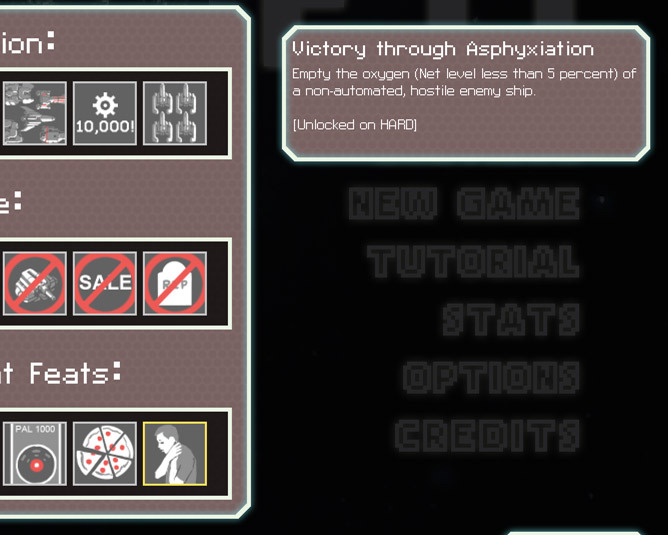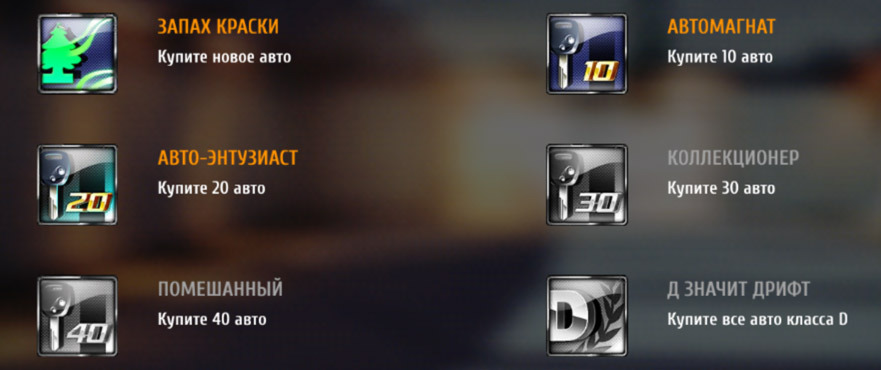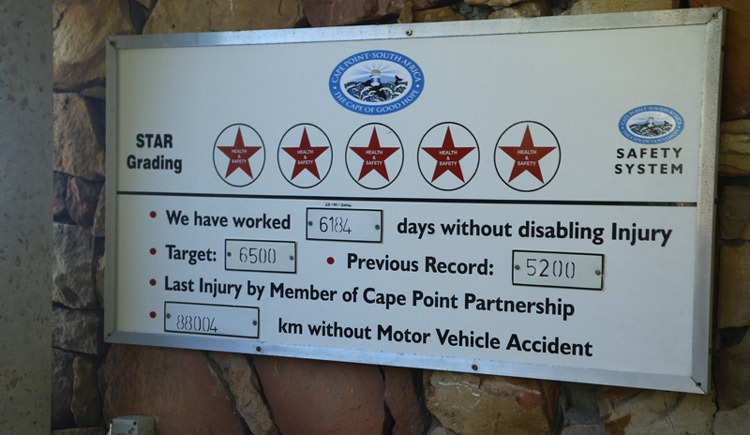Achievement as a tool for player manipulation in GameDev

Achievement, which is given to you for watching your achievements (Galaxy Trucker)
It is customary to think that achievements, “rewards” or “achievements” are some kind of medals that are given for persistent completion of the game. In practice, they are needed for something completely different: this is training, and additional quests, and the formation of the desired behavior, and much more.
Look at this achievement, for example:

It not only allows you to quickly recognize your user profile, but also contains important supporting information. We learn from it that a topic rating of more than 50 is good, and 30 posts with such a rating are a cool achievement. That is, here the problem of accelerating the transfer of information about the user is also solved, and the goal is set (which is right for the community), and the criteria for achieving this goal are indicated.
Reward
The first traditional goal of implementing achievements is a reward. She simply notes some progress or some special achievements. It's nice to sort out achievements and strum old medals: this increases player satisfaction. As a rule, such achievements are quite simple in plot, such as “went to Hard”, “master of shotgun” and so on. The player somehow triggers them during the passage of the game, without doing anything extra. In fact, they describe his playing style. An additional plus of such awards is that they are cool to share on social networks - each of them, in fact, is a compliment. The younger the user, the greater the value of such an award and the desire to share.

Achievements of Fallout: NV - a list of completed quests
Training and motivation
At the very beginning of the game, the achievement can serve as a signal “you are doing everything right” and support the player. You probably saw games where the right actions are reinforced during the period of the first or second game session with rewards. So the user learns that he is not just doing something right, but also moving along the progress bar.
Additionally, when receiving an achive, our user goes to look at the achive list. The achive list at this moment is still the same source of information about how to behave in the game - what is good, what should be strived for and how it all works.
Another important thing is to abandon the game a little harder when you have achieved something there. That is why, after the first game session, the achievable list sometimes gets clogged by a quarter: the game designer tries to create the player’s feeling of work started, serious success and, in places, wild luck. Just so that the second time a person enters the game with the thought of how cool he is doing. And here we can expect unpleasant manipulation, followed by a sharp increase in complexity and an attempt to shake off the donut.
The easiest way to learn is to achieve in the spirit of “The first network game” or “Five network victories”. If taking them gives some bonuses in a single campaign, the player will go and play on the network. And, with a certain probability, he will be drawn in: the game “forced” him to play five matches and try this mode.
New strategies
Deepening the gaming experience is an opportunity to perceive new situations and game styles. Often players are “stuck” in a style that suits them, and to show them other features of the game, you need to change their thinking a bit. Accordingly, there are achievements that require a radical change in the player’s behavior pattern for capture. For example, FTL:

To get this icon in your profile, you need, in fact, to defeat the enemy ship, depriving it of oxygen. Nearby there is an accomplishment for the landing by the whole team - when there will be no one left on your ship, and so on. Each of them is a separate game party with a new approach to strategy.
Quest
A very important function is the creation of a new in-game quest. In fact, this is yet another task, only a little non-standard. Here is an example from Portal:

And here is a no less remarkable quest from Galaxy on Fire:

Such achievements are really lively: in fact, for those who have already completed the game and tried everything there, they give a good reason to play again. In sandbox games, they also create quests for those who cannot just walk around the world and explore it.
Simpler meta-quests such as "collect 100 stars" also give an increase in replay value, but, you see, they are not so interesting.
New experience
Almost the same as learning a new strategy, only the task is different - to increase replay value. Here is an example:

It is rare that one of the players flies to battle with such a team. And here it’s necessary not only to collect four cyber-soldiers, but also to fly out by a truncated team, without psionics, without snipers, and in general somehow differently. New experience as it is.
Social definition
If achievements are open to other players, then they play the role of a kind of signs on clothes, such epaulets and medals. You can quickly and easily understand what kind of person you met. Again, on Habré it is very simple to distinguish "old-timers" thanks to the corresponding achievement.
Only hardcore
Often, the most hardcore achievements make you go through the game again, literally creating a new level of difficulty.
Here is Deus Ex:

If the “Tin” difficulty level were created without Praxis, players would most likely have perceived it worse than achivment. The fact is that in the first case of the level, the game pushes you into the framework and forces you to do something, and in the case of an accomplishment, you limit yourself and achieve victory beautifully, wildly overcoming it. You are cool, not otherwise.
Monetization
What is not very pleasant, achivka can often serve the purpose of monetization. For example, if a player who went through everything without throwing money into the game has an entire list of achievements by 56 points, but one last 57th is missing, he will probably want it. And the 57th is designed so that you can only get it by doing something that is not without donation - and you have to pay at least 1 extra dollar. This is still divine, but there are more rigorous examples designed mainly for the children's psyche:

Achievements in real life
Of course, achievements are used not only in games. More precisely, they are one of the powerful tools for the gamification of ordinary processes. You may know the swarm achivement given in 4sq. It is quite rare, and requires the simultaneous actions of many people. So, several advertising campaigns were built on it. The simplest thing is “Come to our restaurant for a holiday - and at the same time get a swarm achievement.”

Of course, achievements were in the production system, in particular, in the USSR. “Worker of the month”, “Drummer of labor”, “20 blanks per shift”, “Stakhanovets” - this is a good motivation for employees (but only if implemented correctly). The definition of “badge” corresponds very accurately to the achievement - it is a reward that is not an order or a medal. Here is an example from Wiki (who does not know - it was an important crop with industrial significance):

Experiments were carried out with the achievements of "neat driver", "exemplary citizen" and others - they, again, simulate the desired behavior. For the sake of achievement, the driver will become more accurate: for him, this is a kind of bet.
In real life, mechanics are used for various loyalty programs. For example, airline gold cards are also a kind of achievement. And here is a more transparent example:

Here is the training, the task of the image, and the demonstration that normal people travel by plane more often. Or - praise you for being a cool traveler when the scale reaches the right side.
In our practice, there are no achievements in the board games themselves due to the genre. They don’t give out a medal to themselves. We tried a little to experiment in business, thought about giving out special badges for certain quests, which allow us to learn more effectively. Example - the first time I sold a spammer to a call center, survived the New Year, participated in saving a flooded warehouse, and so on. In general, the topic is perhaps interesting, but so far we have postponed it, everything is too glossy and corporate-like. But it certainly worked: in the production of advertising there was a bonus for a series of orders without jambs and delays. As far as I remember, the best “dry series” was three months without one day. When you play this kind of bet, the material reward itself is, of course, important, but the motivation generated by the “argument” is even more important.
And finally, an example on the lift: The

main thing here is that on the 6501st day the men should not relax. After 17 years of waiting.
